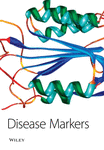Maternal SNPs in the p53 Pathway: Risk Factors for Trisomy 21?
Abstract
The p53 family and its regulatory pathway play an important role as regulators of developmental processes, limiting the propagation of aneuploid cells. Its dysfunction or imbalance can lead to pathological abnormalities in humans. The aim of this study was to evaluate the effect of maternal polymorphisms TP53 c.215G>C (P72R), TP73 4 c.-30G>A and 14 c.-20C>T, MDM2 c.14+309T>G (SNP309), MDM4 c.753+572C>T and USP7 c.2719-234G>A as risk factors for Down Syndrome (DS) birth. A case-control study was conducted with 263 mothers of DS children and 196 control mothers. The distribution of these genotypic variants was similar between case and control mothers. However, the combined alleles TP53 C and MDM2 G, and TP53 C and USP7 A increased the risk of having offspring with DS (OR = 1.84 and 1.77; 95% CI; P < 0.007 and 0.018, respectively). These results suggest that, although the individual polymorphisms were not associated with DS birth, the effect of the combined genotypes among TP53, MDM2 and USP7 genes indicates a possible role of TP53 and its regulatory pathway as a risk factor for aneuploidy.




